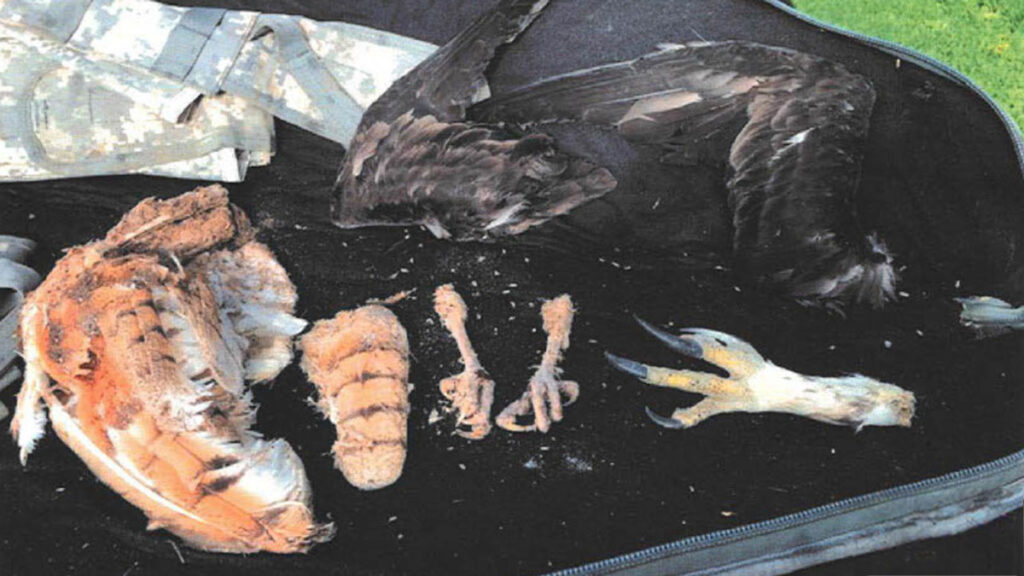Thanks to a brave whistleblower, the U.S. Fish and Wildlife Service (FWS) discovered the unlawful possession of a golden eagle talon and other bird parts in Kilauea, Hawaii in July 2019. Golden eagles are protected by the Bald and Golden Eagle Protection Act and all the species whose parts were discovered are protected by the Migratory Bird Treaty Act.
In 2020, FWS awarded the whistleblower $250 for exposing the wildlife violations, including the illegal transportation of the bird parts across state lines, noting that without the whistleblower “the FWS would not have otherwise known about these violations.”
The existence of this whistleblower award was not previously made public and details about it were made available to Whistleblower Network News in response to a Freedom of Information Act (FOIA) request.
In July, 2019 the whistleblower emailed the Pacific NW Region Migratory Bird Permits Office stating that she was in possession of an eagle claw (which was in fact a talon containing 4 claws) belonging to another individual. “I want the right thing to happen and the police came this past Monday (7-8-19) but would not take it, saying it was not their jurisdiction,” the whistleblower wrote in the email.
“Plus I noticed a reward for aiding in surrender of this type of thing,” the whistleblower further wrote.
In a synopsis of the investigation, a FWS Special Agent highlights the determination of the whistleblower to do the right thing despite the risks of coming forward: “Despite [the defendant] having been deemed a dangerous individual, [the whistleblower] was determined to turn over the wildlife parts to the Service.”
After the Pacific NW Region Migratory Bird Permits Office forwarded the whistleblower’s email to FWS, Special Agents seized the illegally-possessed bird parts. In all, FWS “seized one (1) eagle talon, two (2) wedge-tailed shearwater (Puffinus pacificus) wings, two (2) barn owl (Tuto alba) talons, one (1) barn owl (Tyto alba) wing, and one (1) barn owl (Tyto alba) tail.”
The possession of each of the bird parts is illegal under the Migratory Bird Treaty Act and the Bald and Golden Eagle Protection Act. Furthermore, the transportation of golden eagle parts across state lines violates the Lacey Act.
FWS awarded the whistleblower under the little-known and rarely used whistleblower award provisions of the Lacey Act. According to WNN’s exclusive reporting, from November 2019 through August 2022, FWS only paid out twenty-one whistleblower awards in total. According to whistleblower advocates, this number shows that the agency continues to fail to prioritize whistleblower awards as a powerful enforcement tool despite their proven efficacy in cases such as this one.
“Fish and Wildlife continues to radically underutilize whistleblower awards,” says whistleblower attorney Stephen M. Kohn, a leading expert on whistleblower law. “The program has tremendous potential and could revolutionize the enforcement of wildlife crime. Fish and Wildlife needs to follow the lead of the SEC and other agencies and implement a robust whistleblower award program.”
According to Kohn, part of implementing a robust whistleblower award program is to publicize award payments. For example, while still protecting a whistleblower’s identity by redacting any identifying information, the SEC widely promotes whistleblower awards it issues through its highly successful whistleblower award program. These public announcements help incentivize other whistleblowers to come forward and help deter criminals who worry about having the whistle blown on them.
FWS by contrast has never publicly acknowledged the whistleblower award payment made to the whistleblower who exposed the illegal possession of the bird parts in Hawaii.
“It is a missed opportunity to not publicize successful whistleblower awards,” says Kohn. “Highlighting award payments is a crucial way to inform the public about the opportunity to receive an award in exchange for voluntarily providing key information about wildlife crimes.”
Read More of WNN’s Ongoing Series of Exclusives on Fish and Wildlife Service Whistleblower Awards
WNN Exclusive: Fish and Wildlife Service Whistleblower Awards Remain Severely Underutilized
Fish and Wildlife Service Must Leverage Whistleblower Awards to Fight Wildlife Crimes
WNN Exclusive: Whistleblowers Led to Successful Prosecution in Killing of Oregon Gray Wolf
WNN Exclusive: Whistleblower Exposed the Killer of Wyoming Grizzly Bear
